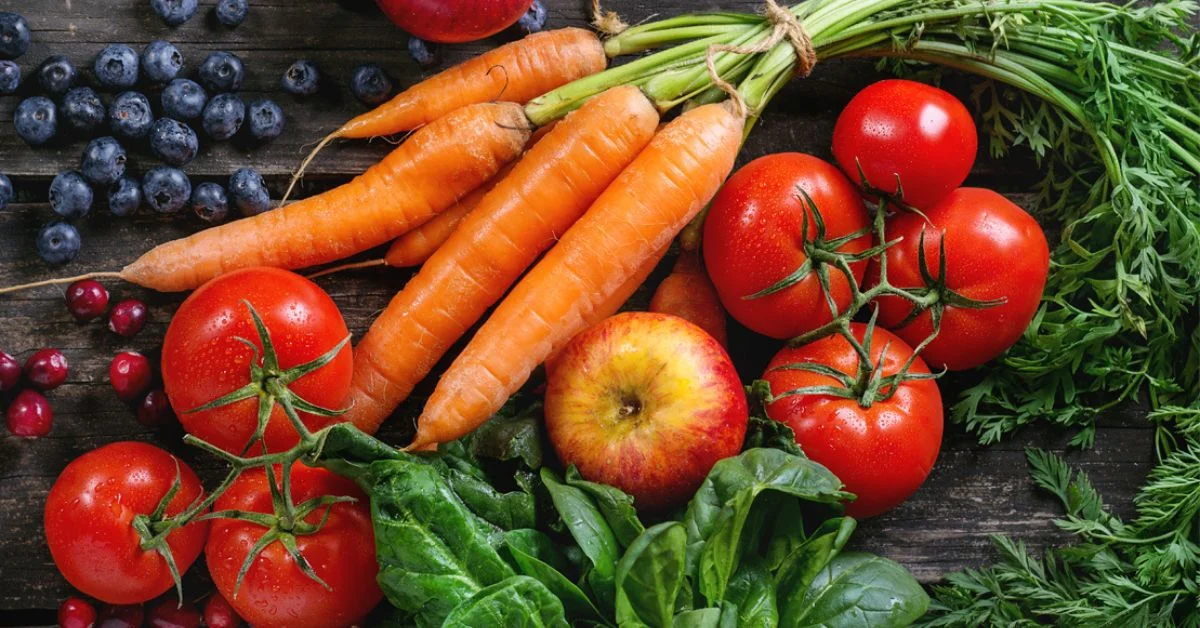HEALTH
How Wellness Nutrition Can Improve Quality of Life in Senior Living

Aging gracefully is something many people hope for, but staying healthy as we get older can feel tough. The great news is that wellness nutrition can help! By making some easy changes to what we eat, seniors can boost their energy and improve their overall quality of life.
In this blog, we will explore how to create an elder nutrition plan that supports healthy aging and share tips for better health for seniors. With the right foods, it’s possible to enjoy a vibrant life at any age, so let’s dive in and discover how to make eating well work for you!
The Importance of Nutrition in Senior Living
As we age, it’s important to pay attention to our eating habits. Good nutrition is crucial for our health, influencing our energy levels and mental clarity. For seniors, a balanced diet can help them live longer and enjoy life more.
To maintain a healthy diet, seniors should eat a variety of nutrients, including vitamins and minerals. This means plenty of fruits, vegetables, lean proteins, and whole grains, while reducing processed foods and added sugars. A nutritious diet can boost health and prevent common illnesses.
Staying hydrated is also vital, as many forget to drink enough water. Seniors should aim for at least eight glasses a day. Offering herbal teas or flavored water can make hydration more enjoyable, helping to prevent tiredness and confusion in daily life. Also, a great independent living for seniors tip is to not skip meals, as this can lead to overeating and unhealthy choices later on.
Boosting Immunity with Nutrient-Rich Foods
A strong immune system is important for seniors because they are more prone to infections. Eating a wellness nutrition diet with antioxidants, vitamins, and minerals can help boost immunity. Fruits and vegetables are full of these nutrients, making them essential for seniors.
Vitamin C in citrus fruits and leafy greens helps the immune system. Foods high in zinc, like nuts and seeds, also support health. Omega-3 fatty acids in fatty fish, like salmon, can reduce inflammation.
Supporting Brain Health with Essential Nutrients
Cognitive decline is a worry for many seniors, but good nutrition can help keep their brains healthy and slow down memory loss. Eating foods rich in omega-3 fatty acids, like salmon and sardines, can protect against this decline. Berries, nuts, and seeds are great for providing antioxidants that fight inflammation.
Promoting Bone Health with Calcium and Vitamin D
Bone health is important for seniors because the risk of fractures and osteoporosis increases as we age. To keep bones strong, seniors should eat foods high in calcium and vitamin D. Good sources of calcium include milk, yogurt, cheese, leafy greens, and fortified plant-based milk. Vitamin D can come from sunlight and foods like fatty fish and fortified cereals.
Explore How Wellness Nutrition Can Improve Quality of Life in Senior Living
In summary, wellness nutrition is key to improving seniors’ quality of life. By sharing meals and engaging in cooking activities, they can build strong social connections that reduce feelings of loneliness. Eating healthy foods helps seniors feel better, stay strong, and think clearly. Encouraging them to share their favorite recipes can create a fun community atmosphere.
Seniors need to focus on a balanced diet full of important nutrients while enjoying social time with others. By following this senior wellness guide, seniors can truly thrive and make the most of their golden years. Let’s celebrate good food and good company!
Did you find this article helpful? Check out the rest of our blogs!
HEALTH
Helpful Tips for Those Suffering With Chronic Pain

Living with chronic pain can be a crippling and stressful experience that affects all facets of your life, including your mental and physical health. Regaining control over your pain is crucial, regardless of whether you have fibromyalgia, arthritis, chronic back pain, or any ailment that causes you discomfort.
Understanding Your Pain and Its Causes
Understanding your pain and its underlying causes is the first step toward properly treating chronic pain. Numerous things, such as trauma, inflammation, nerve damage, or underlying medical disorders, can cause chronic pain. Consider the location, degree, duration, and any triggers or mitigating variables for your pain as you take some time to evaluate your symptoms. To monitor your symptoms and spot any trends or triggers that could be aggravating your pain, keep a pain diary. Understanding the underlying causes of your pain will enable you to collaborate with medical specialists to create a customized treatment plan that takes into account your unique requirements and concerns.
Exploring Treatment Options and Therapies
Investigate different therapy and treatment options that can help reduce your symptoms and enhance your quality of life as soon as you have a better knowledge of your pain and its underlying causes. Treatment options can include prescription or over-the-counter drugs, physical therapy, chiropractic care, acupuncture, massage therapy, or nerve blocks, depending on the kind and intensity of your pain. Furthermore, by encouraging relaxation, lowering stress, and enhancing general well-being, complementary and alternative treatments, including yoga, tai chi, meditation, and mindfulness-based stress reduction approaches, can provide further relief from chronic pain.
Incorporating Lifestyle Modifications for Pain Management
Lifestyle changes can be quite helpful in controlling chronic pain and enhancing your general well-being, in addition to medical therapies and treatments. Make self-care routines that support both physical and mental well-being a priority, such as consistent exercise, a balanced diet, enough sleep, and stress reduction. Walking, swimming, or cycling are examples of low-impact workouts that can enhance cardiovascular health, flexibility, and strength without increasing the chance of injury or worsening discomfort. To promote optimum nutrition and lower inflammation, keep a well-balanced diet full of fruits, vegetables, whole grains, lean meats, and healthy fats. Use stress-reduction methods to ease your mind and release tension, which can aggravate pain sensations. Some of these methods include progressive muscle relaxation, deep breathing, and guided imagery.
Building a Support Network and Seeking Professional Help
It might be lonely to live with chronic pain, but you don’t have to go through this path by yourself. Creating a network of friends, family, and medical professionals who can relate to your experiences can be very helpful in terms of both practical support and emotional support. Seek support, empathy, and company from your loved ones, and don’t be afraid to ask for assistance when required with everyday duties or obligations. Consider joining online forums or support groups for people with chronic pain as well. These spaces allow you to interact with others who have experienced similar things, share resources and information, and provide encouragement and support to one another.
Going to a Clinic for Specialized Care
Consider obtaining specialist care at a pain management clinic if you’ve tried a variety of therapies and interventions but are still unable to find relief from chronic pain. Pain management clinics are specialized medical establishments manned by medical specialists with expertise in the diagnosis and treatment of persistent pain disorders, so it’s important to find a Chicago headache clinic or one in your area depending on what type of pain you are experiencing. These clinics provide thorough assessments, individualized treatment programs made to meet the specific requirements of each patient, and diagnostic testing. Medication management, interventional techniques, physical therapy, psychiatric counseling, and complementary and alternative treatments are a few possible treatment choices. Furthermore, access to multidisciplinary care teams—which include pain experts, physical therapists, psychiatrists, and nutritionists—who work together to address the intricate and multidimensional nature of chronic pain is often made possible by pain management clinics.
Conclusion
Although managing chronic pain can be difficult, it’s important to keep in mind that there are helpful treatment choices and tactics available to assist you in finding relief and enhancing your quality of life. You’re not alone. In your quest for pain treatment, keep in mind to be persistent and patient, and don’t be afraid to ask for assistance when you need it. You can experience relief from chronic pain and lead a more active, fulfilling life without having to worry about being in pain all the time with commitment and assistance.
HEALTH
From Headaches to Back Pain: The Versatile Benefits of Chiropractic Adjustments

Did you know that about 22 million Americans visit chiropractors annually?
Chiropractic care has become popular over the years. This is due to its effectiveness in treating a wide range of health issues. This includes headaches, neck pain, back pain, and joint problems.
It involves making adjustments to the spine to improve health and alleviate pain. But the benefits of chiropractic adjustments go far beyond just pain relief.
In this article, we will explore the versatile benefits of chiropractic care. Read on to learn more.
Improved Nervous System Function
The nervous system is responsible for controlling every cell and organ in our body. Misalignments in the spine can disrupt the communication between the brain and the body. This leads to a variety of health issues.
Chiropractic adjustments help to realign the spine. This improves the nervous system function and promotes overall wellness. It can also strengthen the body’s ability to fight off illness and disease.
Better Posture
Poor posture can cause a lot of strain on the spine. This leads to back pain and other health problems.
Chiropractic adjustments correct misalignments in the spine, resulting in better posture. This can also prevent future injuries and improve athletic performance.
Increased Range of Motion
Restricted movement and stiffness are common symptoms of joint issues. This can limit our ability to perform daily tasks and activities.
Chiropractors can help to increase the range of motion in joints. They use gentle techniques to mobilize the joints and reduce pain. This results in improved flexibility and mobility.
Headache Relief
Headaches are a common health issue that can be caused by tension in the neck and back. Chiropractic adjustments can help to relieve this tension, providing relief from headaches. It also helps to address the root cause of the pain rather than just masking it with medication.
Neck pain can also contribute to tension headaches. Chiropractic help for neck pain can provide relief and help to prevent future occurrences of headaches.
Improved Sleep
Many people struggle with sleep issues such as insomnia or poor sleep quality. Chiropractic methods can help to improve sleep by reducing pain and tension in the body. It can also promote relaxation and reduce stress levels, resulting in better sleep.
Reduction in Osteoarthritis Symptoms
Chiropractic care is beneficial in managing symptoms of osteoarthritis. By maintaining proper alignment and mobility, chiropractic adjustments can decrease the wear and tear on joints. This can reduce pain and stiffness associated with osteoarthritis.
It can also slow down the progression of the disease. This makes chiropractic care a valuable addition to the treatment plan for those suffering from osteoarthritis.
Relief from Pregnancy-Related Discomfort
Many pregnant women experience back pain, neck pain, and joint discomfort due to the physical changes that occur during pregnancy. Chiropractic care is a safe and effective way to relieve these discomforts.
Adjustments can help to balance the pelvis, reduce spinal nerve stress, and enhance overall comfort. It can also help to position the baby properly for birth.
Exploring the Benefits of Chiropractic Adjustments
The benefits of chiropractic adjustments go beyond just treating pain and discomfort. It can improve overall health and wellness by addressing the root cause of health issues.
With its versatility, chiropractic adjustments can benefit people of all ages and backgrounds. Consider scheduling a chiropractor appointment to experience these versatile benefits for yourself. Your body will thank you for it!
Did you find this blog post helpful? If so, feel free to explore more of our blog!
FOOD & DRINKS
Nutrition and Erectile Health: Superfoods for Better Performance

In the quest for overall health and vitality, nutrition plays a pivotal role. While many discussions focus on physical fitness and disease prevention, the impact of nutrition on specific aspects of health, such as erectile health, is often overlooked. By incorporating superfoods into your diet, you can nourish your body and support better performance in various aspects of life, including those moments of intimacy.
Introduction
Nutrition is the foundation of good health, influencing everything from energy levels to immune function. When it comes to erectile health, the foods you eat can have a significant impact on blood flow, hormone balance, and overall cardiovascular health. In this article, we’ll explore some superfoods that can support better performance in various aspects of life, including moments of intimacy.
The Power of Superfoods
Superfoods are nutrient-dense foods that offer a wide range of health benefits. From boosting immunity to supporting heart health, these foods are packed with vitamins, minerals, antioxidants, and phytochemicals that nourish the body and promote overall well-being.
While medications like Cenforce 150 and Fildena 150 can offer temporary relief for performance issues, true vitality comes from within. By prioritizing nutrition and incorporating superfoods into your diet, you can support overall health and well-being, including erectile health. So, next time you’re looking to enhance your performance, consider reaching for a plate of nutrient-packed superfoods. Your body will thank you for it.
Superfoods for Erectile Health
- Dark Leafy Greens: Spinach, kale, and Swiss chard are rich in nitrates, compounds that help improve blood flow by dilating blood vessels. This enhanced circulation can benefit erectile function by promoting healthy blood flow to the genitals.
- Berries: Blueberries, strawberries, and raspberries are loaded with antioxidants, which help protect blood vessels from damage caused by oxidative stress. By reducing inflammation and supporting vascular health, berries can contribute to better erectile function.
- Nuts and Seeds: Almonds, walnuts, and pumpkin seeds are excellent sources of arginine, an amino acid that plays a role in the production of nitric oxide. Nitric oxide helps relax blood vessels, allowing for increased blood flow to the genitals and improved erectile function.
- Fatty Fish: Salmon, mackerel, and trout are rich in omega-3 fatty acids, which have anti-inflammatory properties and support cardiovascular health. By reducing inflammation and improving blood flow, omega-3 fatty acids may help enhance erectile function.
Incorporating Superfoods Into Your Diet
Adding superfoods to your diet doesn’t have to be complicated. Here are some simple ways to incorporate these nutrient-packed foods into your daily meals:
- Smoothies: Blend leafy greens, berries, nuts, and seeds into a delicious smoothie for a nutrient-packed breakfast or snack.
- Salads: Add dark leafy greens, berries, and nuts to your salads for a burst of flavor and nutrition.
- Trail Mix: Create your own trail mix with nuts, seeds, and dried berries for a satisfying and nutritious snack.
- Grilled Fish: Enjoy fatty fish like salmon or trout grilled with a side of leafy greens for a heart-healthy meal.
Conclusion
This article highlights the importance of nutrition in supporting erectile health and suggests incorporating superfoods into the diet as a natural approach to promoting better performance. Additionally, it mentions medications like Cenforce 200 and Fildena as part of a broader discussion on wellness.

 BUSINESS1 year ago
BUSINESS1 year agoExploring the Benefits of Commercial Printing

 HOME IMPROVEMENT12 months ago
HOME IMPROVEMENT12 months agoThe Do’s and Don’ts of Renting Rubbish Bins for Your Next Renovation

 BUSINESS12 months ago
BUSINESS12 months agoBrand Visibility with Imprint Now and Custom Poly Mailers

 HEALTH8 months ago
HEALTH8 months agoThe Surprising Benefits of Weight Loss Peptides You Need to Know

 TECHNOLOGY10 months ago
TECHNOLOGY10 months agoDizipal 608: The Tech Revolution Redefined

 HEALTH8 months ago
HEALTH8 months agoYour Guide to Shedding Pounds in the Digital Age

 HOME IMPROVEMENT8 months ago
HOME IMPROVEMENT8 months agoGet Your Grout to Gleam With These Easy-To-Follow Tips

 HEALTH11 months ago
HEALTH11 months agoHappy Hippo Kratom Reviews: Read Before You Buy!












